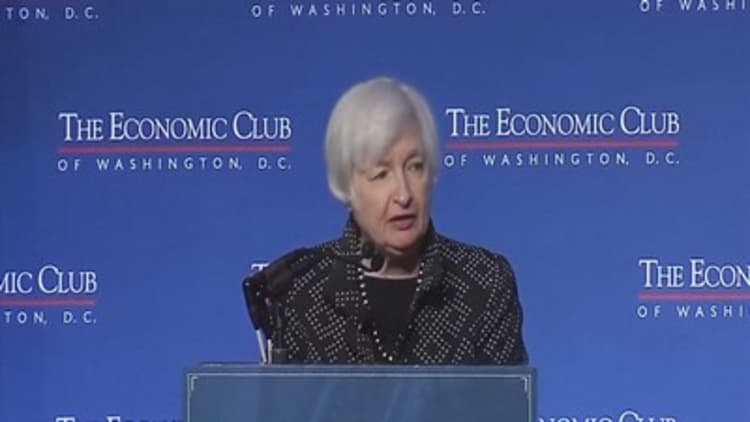


It's not every day that the chair of the Federal Reserve takes a public opinion on a specific piece of Wall Street research. But Thursday, Janet Yellen found herself compelled to do just that.
In testimony before Congress' Joint Economic Committee, Yellen was asked by Rep. Pat Tiberi about a piece of research released by Citigroup's rates strategy team Monday.
Read More Fed's Yellen: US economy close to full employment
Specifically, Tiberi, an Ohio Republican, wanted to know what Yellen made of Citi's conclusion that there is a 65 percent chance of a U.S. recession in 2016.
"The economists said that they would assign about a 65 percent likelihood of a recession in the United States in 2016. Now, 65 percent sounds high to me, but I'm not an economist and I'm not the Fed chair. But zero risk might be too low as well. So what would you assign a risk level of a recession next year?" Tiberi asked.
While making clear that she "cannot put a number on the risk of a recession," Yellen did go on to directly disagree with the Citi analysis.
"I absolutely wouldn't see it as anything approaching 65 percent," the central banker said.
This is not a huge surprise, given that the Fed has forecast GDP growth of about 2.3 percent in 2016, which is neither a gangbusters nor recessionary number.
Interestingly, the chief concern raised by Citi's global head of G-10 rates strategy, Harvinder Sian, appears to be that Fed policy is not accommodative enough.
Thanks to "the pernicious effects of a debt super-cycle ... pushing natural rates to zero or below in many regions including the U.S., Europe and Japan," the historically low rates maintained by the Federal Reserve and others "looks only superficially like easy central bank policies."
This is akin to the argument made in a recent paper released by the Federal Reserve Bank of San Francisco: "Monetary conditions remain relatively tight despite the near-zero federal funds rate, which in turn is keeping economic activity below potential and inflation below target."
Read More Surprising Fed paper drops a dovish bombshell
In other words, the concern is that while rates are low, they are not low enough.
Interestingly, then, Citi's ultimate concern appears to be that the Fed is pursuing policies that are too hawkish. Of course, the opposite argument, that rates have been too low for too long, has long been the more prevalent complaint on Capitol Hill.






